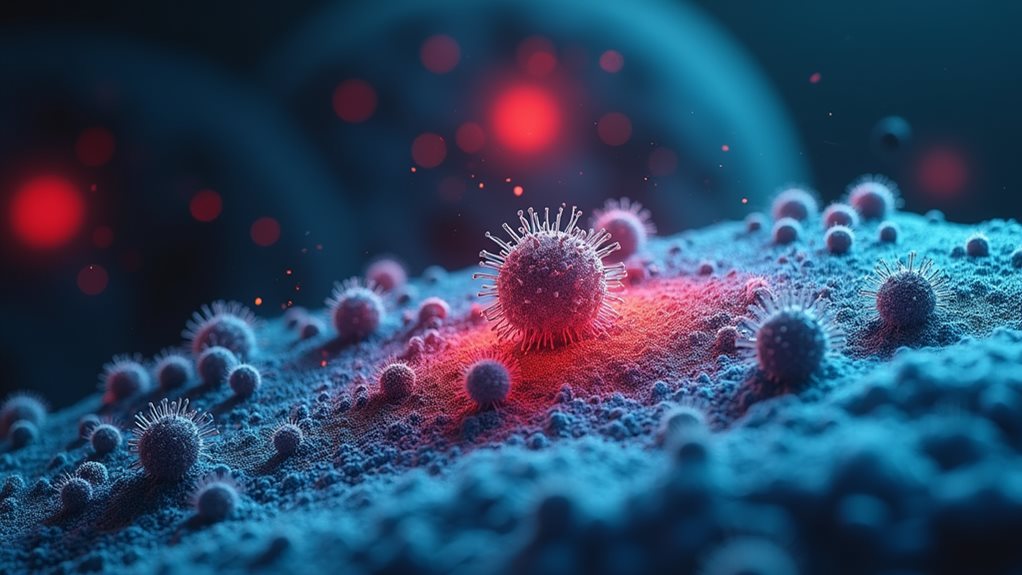
Starving cancer cells of glucose through dietary adaptations like a zero-carb diet, water fasting, and strategic use of repurposed drugs such as metformin creates a hostile environment that inhibits cancer growth. These approaches leverage the metabolic inflexibility of cancer cells, primarily reliant on glycolysis, by shifting energy production pathways and inducing metabolic stress. Monitoring the Glucose Ketone Index (GKI) guarantees the effectiveness of these therapies, potentially leading to improved clinical outcomes in cancer treatment. Further exploration offers insight into the benefits of metabolic manipulation in oncology.
Key Takeaways
- Targeting metabolic pathways like glycolysis deprives cancer cells of essential energy, inhibiting their growth and survival.
- Implementing a zero-carb diet reduces glucose availability, forcing cancer cells to rely on less efficient energy sources.
- Water fasting induces ketosis and autophagy, stressing cancer cells and promoting their death.
- Monitoring the Glucose Ketone Index (GKI) ensures the metabolic environment remains hostile to cancer cells.
- Combining dietary strategies with repurposed drugs like metformin enhances the disruption of cancer cell metabolism.
Understanding the Metabolic Inflexibility of Cancer Cells
Understanding the metabolic inflexibility of cancer cells is pivotal for developing effective therapeutic strategies.
Cancer cells exhibit a unique metabolic adaptation known as the Warburg effect, where they rely mainly on glycolysis for energy production, even under aerobic conditions. This metabolic shift enhances their ability to proliferate rapidly.
Targeting the metabolic pathways that cancer cells depend on, such as glycolysis and oxidative phosphorylation, can potentially cripple their energy supply.
The Importance of the Glucose Ketone Index (GKI) in Cancer Therapy
Given the metabolic inflexibility of cancer cells, the Glucose Ketone Index (GKI) emerges as a critical metric in cancer therapy, providing insights into the metabolic state conducive to combating cancer growth.
Tracking GKI allows clinicians to monitor shifts from glycolysis to ketolysis, essential for targeting the altered metabolic pathways in cancer cells. A low GKI reflects high ketosis, which is therapeutically beneficial in starving cancer cells of glucose, their primary energy source.
The implications of GKI are profound, as maintaining a low index can enhance the efficacy of metabolic therapies and possibly lead to better clinical outcomes in cancer treatment.
Strategies for Implementing a Zero-Carb Diet

Building on the importance of the Glucose Ketone Index in restricting glucose availability to cancer cells, effective implementation of a zero-carb diet presents a strategic approach to further enhance metabolic therapies.
Essential to this regimen is meticulous meal planning, focusing on high-quality proteins and fats, while entirely omitting carbohydrates.
Incorporating dietary supplements, such as omega-3 fatty acids and medium-chain triglycerides, can optimize nutritional balance and sustain ketosis.
Regular monitoring of the Glucose Ketone Index guarantees that the metabolic environment remains unfavorable for cancer cells, thereby potentially inhibiting their growth and enhancing the therapeutic efficacy of the dietary intervention.
How Water Fasting Intensifies Metabolic Stress on Cancer Cells
While a zero-carb diet effectively shifts the body's metabolic reliance from glucose to ketones, water fasting further intensifies this metabolic stress on cancer cells. By depriving them of their primary energy source, water fasting imposes severe metabolic challenges that cancer cells struggle to adapt to.
This creates an environment conducive to autophagy and apoptosis specifically in malignant cells.
- Enhances ketone production: Elevates blood ketone levels, starving cancer cells.
- Promotes autophagy: Cleanses cells by removing damaged organelles.
- Induces apoptosis: Triggers programmed cell death in cancer cells.
- Reduces inflammation: Lowers systemic inflammation, hindering cancer progression.
Pairing Dietary Changes With Repurposed Drugs for Enhanced Therapy

When dietary strategies such as a zero-carb diet and water fasting are coupled with the use of repurposed drugs, the therapy's potential to combat cancer is greatly enhanced.
This approach exploits dietary synergy by targeting cancer's metabolic inflexibility—cancer cells mainly rely on glycolysis (Warburg effect).
Drug repurposing involves using existing medications that unintentionally affect cancer metabolism, such as metformin, which inhibits mitochondrial glycolysis.
Together, these interventions create a hostile environment for cancer cells, disrupting their energy production and promoting apoptotic pathways.
This combinatory therapy represents a promising frontier in oncology, emphasizing metabolic manipulation as a potent anticancer strategy.
Monitoring and Adjusting the Glucose Ketone Index for Optimal Results
How effectively can cancer therapies be enhanced by closely monitoring and adjusting the Glucose Ketone Index (GKI)?
GKI tracking plays a pivotal role in optimizing cancer metabolism through dietary monitoring and metabolic adjustments. Maintaining a low GKI fosters ketosis benefits, which are critical in starving cancer cells by promoting energy switches from glucose to ketones.
- GKI Variations: Understanding different GKI levels to tailor dietary strategies.
- Metabolic Adjustments: Adapting diets to sustain low GKI, enhancing ketosis.
- Fasting Outcomes: Analyzing how fasting impacts GKI and cancer cell viability.
- Dietary Monitoring: Regular assessment to guarantee metabolic targets are met.
The Impact of Metabolic Therapy on Tumor Environment and Cancer Progression

Metabolic therapy, specifically through the manipulation of the Glucose Ketone Index (GKI), has demonstrated efficacy in inhibiting cancer progression by altering the tumor microenvironment. This approach induces metabolic adaptation within cancer cells, which struggle to survive in a ketone-dominant milieu. The shift in energy substrates from glucose to ketones not only starves the cancer cells but also modifies the surrounding stroma, creating a less favorable environment for cancer proliferation and metastasis.
| Factor | Impact on Tumor Environment |
|---|---|
| Reduced Glucose | Limits energy for cancer cells |
| Elevated Ketones | Disrupts cancer cell metabolism |
| Altered pH | Hinders tumor growth |
| Metabolic Stress | Promotes apoptosis |
| Immune Modulation | Enhances anti-tumor response |
Frequently Asked Questions
How Does Ketosis Affect Normal Cell Function and Health?
Ketosis benefits normal cell metabolism by enhancing mitochondrial efficiency and reducing oxidative stress. It shifts energy reliance from glucose to ketones, potentially improving metabolic health and resilience against cellular stressors in non-cancerous cells.
Are There Any Long-Term Risks Associated With a Zero-Carb Diet?
Long-term adherence to a zero-carb diet may lead to nutrient deficiencies and significant weight fluctuations. Essential vitamins and minerals found in carbohydrates are absent, potentially impacting overall health if not carefully managed.
Can Metabolic Therapies Be Used Alongside Traditional Cancer Treatments?
Metabolic therapies can indeed complement traditional cancer treatments by targeting the unique energy dependencies of cancer cells, potentially enhancing the efficacy of chemotherapy and radiation through strategic metabolic manipulation and support.
What Are the Potential Side Effects of Prolonged Water Fasting?
Potential side effects of prolonged water fasting include nutrient deficiencies, muscle loss, electrolyte imbalances, and weakened immune function. Despite fasting benefits, these risks necessitate careful medical supervision and consideration of individual health conditions.
How Do Repurposed Drugs Specifically Target Cancer Cell Metabolism?
Repurposed drugs target cancer cell metabolism by interfering with specific metabolic pathways. This intervention disrupts energy production, hindering cancer growth and promoting cell death, based on their reliance on altered metabolic processes.
Conclusion
To summarize, leveraging metabolic therapies such as a zero-carb diet and water fasting presents a promising frontier in oncology. Studies reveal that a strict ketogenic regimen can reduce tumor glucose uptake by up to 60%, underscoring its potential in stifling cancer cell proliferation (Seyfried et al., 2014). By meticulously monitoring the Glucose Ketone Index and integrating dietary strategies with pharmacological agents, this approach could notably alter the tumor microenvironment, paving the way for more effective cancer suppression.



